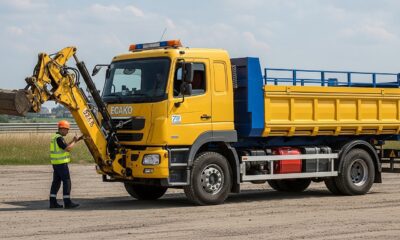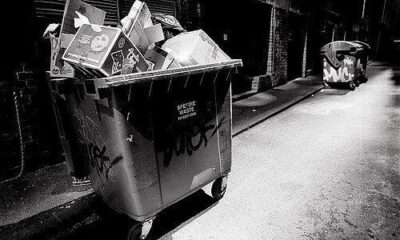

Economy
Scotland Showcases Circular Economy Business Opportunities at Scottish Resources Conference
Examples of what a circular economy could mean for Scotland in practice have been on show this week at the second day of the Scottish Resources Conference, the leading national industry event in Scotland.
Organisations already being supported to adopt more circular practices themselves – or encourage networks and key sectors to do so –featured prominently, including Falkirk lighting leasing firm Juice, Forfar-based Ogilvy Spirits and The Scottish Leather Group.
Developments in sectors as varied as bio-economy and textiles were also outlined, including the presentation on opportunities within the oil & gas sector based on a new evidence report jointly published by Zero Waste Scotland and the Royal Society of Arts and Manufacturing.
The conference also represented an opportunity to discuss issues to feed into the Scottish Government’s consultation on the circular economy, Making Things Last, which closes at the end of this month.
Setting Scotland’s progress within a broader context, European official Kestutis Sadauskas will address day two of the Scottish Resources Conference, organised by the Chartered Institutions of Wastes Management (CIWM) and Zero Waste Scotland, discussing European ambitions for a circular economy.
Scottish Government Environment Secretary Richard Lochhead said: “We are making progress in Scotland with regard to realising the exciting opportunities presented by the circular economy, and looking at how we make the best use of our precious resources and make things last – a principle that we can apply from everything from our clothing to industrial processes in key industries. . The business opportunities for Scotland are tremendously exciting and it’s great to see such a range of companies highlighted at this event.
“I look forward to hearing as broad a range of views from as many people as possible on how to maximise the benefits which a circular economy will have for Scotland, both economically and environmentally.”
Iain Gulland, Chief Executive, Zero Waste Scotland, said: “I was delighted to welcome an EU representative to the Scottish Resources Conference, to hear his international perspective on the circular economy, and to be able to share our examples of circular economy business development which are happening here in Scotland. We aren’t only discussing the possibilities for change, we’re exploring these exciting new business opportunities, such as that with the oil and gas sector being outlined today by RSA. We are keen to examine how Zero Waste Scotland can help these businesses thrive, and others to adopt circular models that will ensure a sustainable future, both economically and in terms of our all-important stewardship of resources.”
The RSA and Zero Waste Scotland presented early findings from their North Sea Oil and Gas Rig Decommissioning & Re-use Opportunity Report, which finds that the potential for re-use in the sector, particularly around the decommissioning of rigs, is “significant.”
It finds that the potential benefits of adopting circular economy principles within the oil and gas sector in Scotland would be to:
– reduce the environmental impacts associated with recycling/disposal of materials;
– reduce the net cost of decommissioning; and
– develop new oil and gas industry sub-sectors which could offer additional job creation opportunities for supply chain companies in a lower oil price economy.
Sophie Thomas, Director of Circular Economy at the RSA, who addressed the conference today, said: “The RSA Great Recovery has been working closely with Zero Waste Scotland to identity opportunities in where a more circular approach could bring increased opportunity and value into sectors. Our report North Sea Oil and Gas Rig Decommissioning and Re-use Opportunity is the first of our publications. By working with key stakeholders in the circular network we have developed a series of recommendations that are based on practical auditing and cross sector business creation. There is untapped value and great opportunity for Scotland to develop a world-class circular industry around oil and gas rig decommissioning.”
Dan Epstein, The Great Recovery Team, said: “There are very few industries that lend themselves so readily to adoption of circular economy principles and practice. With a very large forward order book of oil and gas assets that will be decommissioned and removed from the North Sea over the next 20 years that have a potentially very significant reuse value, developing a comprehensive programme to land and reclaim all or part of those assets in the UK will create financial value, new skills and jobs and expertise in a globally important new sector.”
Colin McLaughlin, of lighting rental and leasing firm Jiuce, which is part of the Zero Waste Scotland circular economy business models programme, said this had transformed his business: “The support from Zero Waste Scotland has helped us develop marketable solutions which will accelerate the take up of LED lighting in commercial property. Throughout the process they have kept Juice focussed on the end objective, challenged where necessary and provided support when we required. It is fair to say that we would not have been able to launch a ‘Rent a Light’ service without them.”
Also working with Zero Waste Scotland is Scottish business Ogilvy Spirits embraces the principles of a circular economy by distilling award-winning vodka from potatoes not suitable for the supermarket. The family-run farm in Forfar takes low grade potatoes that would normally be used for cattle feed and turns them into a high value exportable product with a long shelf-life. Graeme Jarron, Co-Founder, Ogilvy Spirits, said: “I wanted to build a future for further generations, to create something from our farm’s produce, starting small, and then hopefully sharing it worldwide.”
Zero Waste Scotland is also working with the Scottish Leather Group on a project to remanufacture leather by-products. The Scottish Leather Group Limited has had support to develop a circular model which sees cutting waste from the manufacturing process (for interiors for the automotive industry) transformed into high-value add-on products for use in the industry.”


 Environment12 months ago
Environment12 months agoAre Polymer Banknotes: an Eco-Friendly Trend or a Groundswell?

 Features11 months ago
Features11 months agoEco-Friendly Cryptocurrencies: Sustainable Investment Choices

 Features12 months ago
Features12 months agoEco-Friendly Crypto Traders Must Find the Right Exchange

 Energy11 months ago
Energy11 months agoThe Growing Role of Solar Panels in Ireland’s Energy Future





























